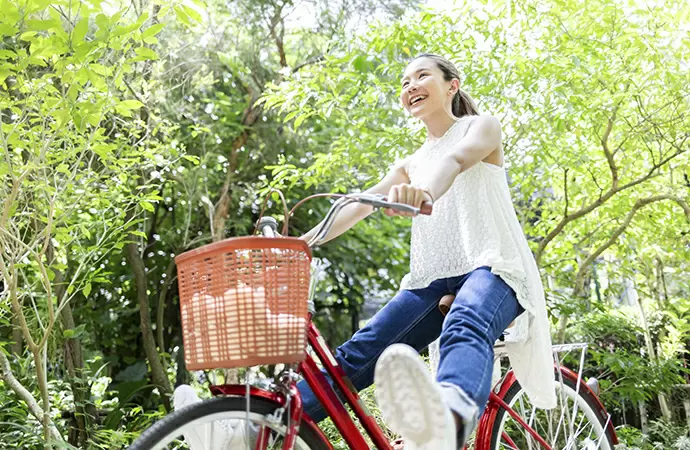https://www.staffservice.co.jp/cheer/help/sunlight.html
I shared it.

As a preventive measure against the infection of the new coronavirus, more people are working from home and many are refraining from going out. When I noticed, I stayed inside the house and wasn't exposed to the sun! ?? That also means. The reason why I feel a little unwell, frustrated by a little thing, and somehow stressed these days may be because I haven't been exposed to the sun. This time, we will introduce the effects of sun bathing such as stress relief and the easy sun bathing method.
table of contents
Relationship between sun bathing and stress

In Scandinavian countries such as Finland and Sweden, "seasonal depression (SAD)", which causes depression such as depression, dullness, and easy tiredness, has long been a problem in winter when the sunshine hours are short. .. This is also called winter depression, and even in Japan, there are people who develop SAD during the rainy season when the daylight hours are reduced and in winter. It is generally said that SAD is caused by a deficiency of neurotransmitters such as serotonin and dopamine secreted in the brain, but it is thought that one of the causes is that sufficient vitamin D cannot be produced subcutaneously due to lack of sunshine. It has been.
Let's see how serotonin and vitamin D, which are closely related to sun bathing, are related to work.
Happiness hormone "serotonin"

Humans secrete the neurotransmitter serotonin into the brain to reduce stress. Serotonin is one of the neurotransmitters that make the brain work actively, and is also called "happiness hormone".
In order to increase serotonin, it is necessary to take a sun bath, moderate exercise, and a well-balanced diet. It is said that increasing serotonin can be expected to have effects such as relieving stress, improving concentration, and brightening feelings.
Conversely, a deficiency of serotonin can cause symptoms such as chronic stress and fatigue, insomnia, decreased work motivation, lack of coordination, and depression.
Nikko Hormone "Vitamin D"

Vitamin D is also made in the body by sunbathing. Vitamin D is known to help absorb calcium, strengthen bones, and be used in the treatment of osteoporosis. It works like a hormone in the body, such as regulating and maintaining the function of immunity, and plays an important role in issuing various commands to cells throughout the body.
Vitamin D is also known as "sunlight hormone" because it has such a variety of functions and is produced by the skin when exposed to ultraviolet rays.
However, it is estimated that about half of the Japanese are deficient in vitamin D. The reason is that modern people are afraid of the harmful effects of ultraviolet rays, such as applying sunscreen, wearing parasols, and wearing gloves even in the summer, to avoid excessive sunlight. .. In addition, many people refrain from going out due to the influence of the new coronavirus, and there are concerns about lack of sunlight.
Depending on the individual, diseases that are thought to be associated with vitamin D deficiency include cancer, dementia, allergic diseases, infectious diseases, and psychiatric disorders (depression, seasonal depression, autism, etc.) Schizophrenia) and so on. It is also known that taking vitamin D supplements can alleviate the symptoms of hay fever.
Recommendation of sun bathing to keep your mind and body healthy

If you master the right way to sunbathe, you may be able to see all the benefits. If you are stressed, unmotivated to work, or tend to be frustrated, start living today with the benefits of sunbathing in mind. ■ It is recommended to sunbathe in the spring and summer after noon
, with a guideline of about 15 minutes a day .
Please note that the amount of ultraviolet rays will increase in the afternoon. You can also sunbathe in the shade, being careful not to get heat stroke. However, sunbathing until it turns red is evidence of excessive bathing. There are individual differences, so if you are prone to sunburn, start from a short time.
■ Autumn / winter sunbathing is about 30 minutes a day,
and it is said that autumn / winter is a season when there is little ultraviolet light and it is difficult to produce vitamins. We recommend sunbathing for about 30 minutes longer than in spring and summer.
■ Sunscreen Applying
sunscreen makes it harder for vitamin D to be produced, but if you are concerned, apply sunscreen only to the face, which has a small area. If you really want to apply it, a special sunscreen has been developed that allows only the UV rays needed for vitamin D synthesis to pass through, so consider it.
■ Vitamin D is produced by going out and sunbathing and
exposing it to the UVB waves of ultraviolet rays. Therefore, even if it is sunny, the glass blocks UV rays by the window, so it is important to note that vitamin D is not produced.
We recommend going out for lunch, walking or gardening on holidays, and sunbathing outside.
Supplement Serotonin and Vitamin D with Diet

When supplementing serotonin outside of the sun, we recommend eating foods high in tryptophan, the source of serotonin, such as dairy products, soy products, and bananas.
Foods that contain vitamin D include fish and mushrooms. Vitamin D can also be taken from supplements. However, taking high doses of vitamin D can lead to vitamin A deficiency. Vitamin A deficiency can cause dry eye and acne, so be sure to take vitamin A with it. It is abundant in liver and eel in the diet, but it can also be taken as a supplement.
However, a well-balanced diet is essential for physical and mental health. Don't be too biased and try to make up for it.
summary
Sun bathing has the effect of making not only the body but also the mind healthy. Let's make an opportunity to sunbathe by walking etc. on a sunny day. We recommend sunbathing for 15 minutes in spring and summer and 30 minutes in autumn and winter, but be careful not to put a strain on your body as the amount of UV rays varies depending on the area and season. Also, while hydrating, prevent heat stroke.
Supervision
Physician / Director
, Institute of Functional Medicine , Japan Born in 1973. After graduating from Japan Medical College in 1998, became an obstetrician and gynecologist. After that, he established a total anti-aging theory that integrates cosmetology and dermatology treatment, nutrition therapy, intravenous therapy, and hormone therapy. In 2008, the "Institute of Functional Medicine in Japan" was established to promote the spread and research of "functional medicine". His writings include "Surfers do not have hay fever" (Shogakukan), "The idea of" functional medicine "that cures chronic diseases from the ground up" (Kotsusha Shinsho), "Carbohydrate restriction + Ketone body circuit with health". "Turn to lose weight in a healthy way! Ketone body diet" (Kodansha), "Keep away from illness!
https://ifmj.jp/








0 コメント:
コメントを投稿